Ditapis dengan
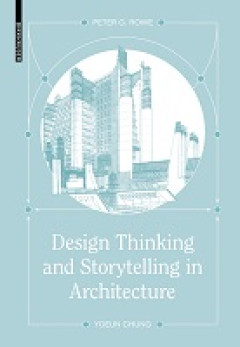
E-book Design Thinking and Storytelling in Architecture
This book offers a systematic account of the process of designing in architecture. Design thinking can be regarded as a fundamentally different way of knowing the world and a particular form of addressing creative problems. In this publication, the authors undertake to explore multiple and often controversial theoretical stances on the topic. Underlying principles of inquiry are present in all …
- Edisi
- -
- ISBN/ISSN
- 9783035628111
- Deskripsi Fisik
- 168 halaman
- Judul Seri
- -
- No. Panggil
- 720.6 ROW d
E-book The Jesus Mysteries
- Edisi
- -
- ISBN/ISSN
- 0722536771
- Deskripsi Fisik
- 256 halaman
- Judul Seri
- -
- No. Panggil
- 232 FRE t
- Edisi
- -
- ISBN/ISSN
- 0722536771
- Deskripsi Fisik
- 256 halaman
- Judul Seri
- -
- No. Panggil
- 232 FRE t
E-book Ocean: The Definitive Visual Guide
- Edisi
- -
- ISBN/ISSN
- 9871465419682
- Deskripsi Fisik
- 514 halaman, ilus.
- Judul Seri
- -
- No. Panggil
- 577.73 FRA o
- Edisi
- -
- ISBN/ISSN
- 9871465419682
- Deskripsi Fisik
- 514 halaman, ilus.
- Judul Seri
- -
- No. Panggil
- 577.73 FRA o
E-book Electoral Management Design
The credibility and legitimacy of electoral processes is inextricably linked to electoral integrity. The Global Commission on Democracy, Elections and Security identified five major challenges to the conduct of elections with integrity in its 2012 report: building the rule of law to substantiate claims to human rights and electoral justice, developing professional and competent electoral manage…
- Edisi
- revised ed.
- ISBN/ISSN
- 9789187729669
- Deskripsi Fisik
- 480 hlm
- Judul Seri
- -
- No. Panggil
- 324.6 CAT e
E-book Marketing
Marketing involves more than just activities performed by a group of people in a defined area or department. In the often quoted words of David Packard, cofounder of Hewlett-Packard, “Marketing is too important to be left only to the marketing department.” Marketing entails processes that focus on delivering value and benefits to customers, not just selling goods, services, and/or ideas. It…
- Edisi
- -
- ISBN/ISSN
- 9781439039427
- Deskripsi Fisik
- 809 hlm
- Judul Seri
- -
- No. Panggil
- 658.8 LAM m
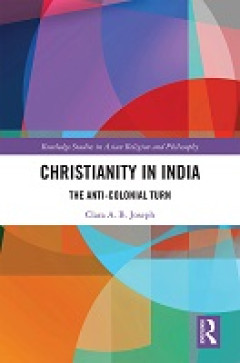
E-Book Christianity in India: The Anti-Colonial Turn
By studying the history and sources of the Thomas Christians of India, a community of pre-colonial Christian heritage, this book revisits the assumption that Christianity is Western and colonial and that Christians in the non-West are products of colonial and post-colonial missionaries. Christians in the East have had a difficult time getting heard—let alone understood as anti-colonial. This …
- Edisi
- -
- ISBN/ISSN
- 9781351123839
- Deskripsi Fisik
- 189 halaman
- Judul Seri
- -
- No. Panggil
- 230 JOS c
E-book Get Out of Your Mind & Into Your Life for Teens a Guide to Living an E…
This book is designed to help you become stronger and develop skills that we call mindful warrior skills. We get that this might sound a little weird right now. What is a mindful warrior, anyway? Well, it isn’t someone who runs out onto the field of battle like a maniac. It isn’t someone who acts impulsively and aggressively. And it isn’t someone who’s cold and calculating, like a psych…
- Edisi
- -
- ISBN/ISSN
- -
- Deskripsi Fisik
- 154 hlm
- Judul Seri
- -
- No. Panggil
- 155.25 CIA g
E-book The Global E-waste Monitor 2020 : Quantities, Flows, and The Circular …
This monitor provides the most comprehensive update of global e-waste statistics. In 2019, the world generated a striking 53.6 Mt of e-waste, an average of 7.3 kg per capita. The global generation of e-waste grew by 9.2 Mt since 2014 and is projected to grow to 74.7 Mt by 2030 – almost doubling in only 16 years. The growing amount of e-waste is mainly fueled by higher consumption rates of EEE…
- Edisi
- -
- ISBN/ISSN
- 9789280891140
- Deskripsi Fisik
- 120 hlm
- Judul Seri
- -
- No. Panggil
- 628.4 FOR t
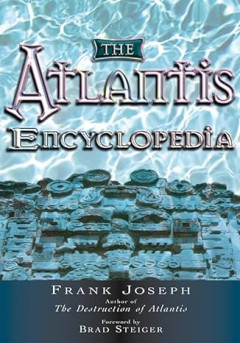
E-Book The Atlantis Encyclopedia
This is an invaluable, one-of-a-kind reference. Unlike most other books on the subject, The Atlantis Encyclopedia offers fewer theories and more facts. Although it does not set out to prove the sunken capital actually existed, The Atlantis Encyclopedia musters so much evidence on its behalf, even skeptics may conclude that there must be at least something factual behind such an enduring, indeed…
- Edisi
- -
- ISBN/ISSN
- 1564147959
- Deskripsi Fisik
- 312 halaman
- Judul Seri
- -
- No. Panggil
- 001.9 JOS t
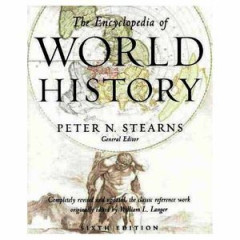
E-Book The Encyclopedia of World History: Ancient, Medieval, and Modern - Six…
Renowned historian Peter N. Stearns and thirty prominent historians have combined their expertise over the past ten years to perfect this comprehensive chronology of more than 20,000 entries that span the millennia from prehistoric times to the year 2000.
- Edisi
- -
- ISBN/ISSN
- 0227679687
- Deskripsi Fisik
- 3540 halaman
- Judul Seri
- -
- No. Panggil
- 903 STE t
E-book Textbook of Plastic and Reconstructive Surgery
Plastic and reconstructive surgery is a branch of surgery that specialises in restoring form and function to damaged or missing tissues and skin. The causes of such defects are usually related to surgery, injury, illness or congenital abnormality. This rapidly evolving specialty is based upon the exploitation of key principles of anatomy, physiology, pathology and surgery. Mastery of these prin…
- Edisi
- -
- ISBN/ISSN
- 9781910634394
- Deskripsi Fisik
- 491 hlm
- Judul Seri
- -
- No. Panggil
- 617.95 ADI t
E-Book Visnu-Narayana: Changing Forms and the Becoming of a Deity in Indian R…
The contributions collected in this volume deal with the complex history of the Indian deity Vi??u-N?r?yana. This conception of God evolved in various traditions in India, especially in South India, during the first millennium CE. The history of this development is reconstructed here by various means, including philological exegesis, the history of ideas, and iconographic evidence.
- Edisi
- -
- ISBN/ISSN
- -
- Deskripsi Fisik
- 502 halaman
- Judul Seri
- -
- No. Panggil
- 294.5 SCH v
E-book Botany Illustrated : Introduction to Plants, Major Groups, Flowering P…
The major category is called a division and is equivalent to phylum in the animal kingdom. Division name endings indicate plants (-phyta) and fungi (-mycota). In the top illustration are some examples of Magnoliophyta, the flowering plant division. The endings of lesser categories indicate class (-opsida), subclass (-idea), order (-ales), and family (-aceae). Classification of one specific plan…
- Edisi
- -
- ISBN/ISSN
- 0387288759
- Deskripsi Fisik
- 291 hlm
- Judul Seri
- -
- No. Panggil
- 580 GLI b
E-book Handbook of Herbs and Spices
The history of herbs and spices is as long as the history of mankind. People have used these plants since earliest times. No other commodity has played a more pivotal role in the development of modern civilization as spices. The lives of people and plants are more entwined than is often realized. Some herbs have the power to change our physiological functioning, they have revolutionized medicin…
- Edisi
- Vol. 2
- ISBN/ISSN
- 185573835X
- Deskripsi Fisik
- 365 hlm
- Judul Seri
- -
- No. Panggil
- 635.7 PET h
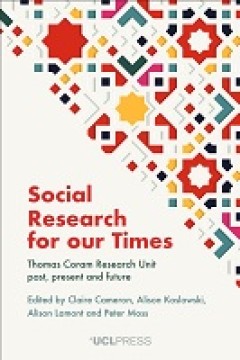
E-Book Social Research for our Times: Thomas Coram Research Unit past, presen…
For 50 years, researchers at UCL’s Thomas Coram Research Unit have been undertaking ground-breaking policy-relevant social research. Their main focus has been social issues affecting children, young people and families, and the services provided for them. Social Research for our Times brings together different generations of researchers from the Unit to share some of the most important result…
- Edisi
- -
- ISBN/ISSN
- 9781800084056
- Deskripsi Fisik
- 418 halaman
- Judul Seri
- -
- No. Panggil
- 300.72 CAM s
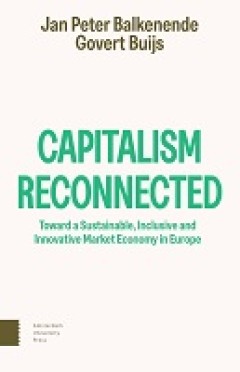
E-Book Capitalism Reconnected: Toward a Sustainable, Inclusive and Innovative…
Capitalism has gone astray. Today we face ecological exhaustion, persistent inequality, financialization, stress on communities, short-termism, and new power concentrations. An avalanche of new economic thinking and a reorientation of European values show the way toward a different economy. A new perspective is necessary if we want to implement the Sustainable Development Goals and if we consid…
- Edisi
- -
- ISBN/ISSN
- 9789048562633
- Deskripsi Fisik
- 401 halaman
- Judul Seri
- -
- No. Panggil
- 330.112 BAL c
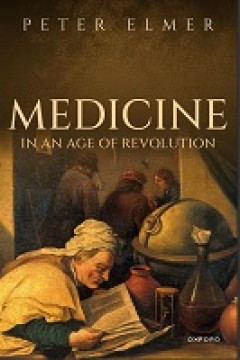
E-Book Medicine in an Age of Revolution
This work is the first major attempt since the 1970s to challenge the idea that the essential engine of medical (and scientific) change in seventeenth-century Britain emanated from puritanism. It seeks to reaffirm the crucial role of the period of the civil wars and their aftermath in providing the most congenial context for a re-evaluation of traditional attitudes to medicine. In the process, …
- Edisi
- -
- ISBN/ISSN
- 9780198853985
- Deskripsi Fisik
- 471 halaman
- Judul Seri
- -
- No. Panggil
- 610.1 ELM m
Edisi Kolektor Stephen Hawking : A Mind Without Limits (Apa yang diajarkan sa…
Lihatlah ke bintang-bintang di atas, bukan ke kakimu di bawah. Pahami apa yang kau lihat, dan bertanyalah tentang apa yang membuat Alam Semesta ini ada. Bertanyalah." - Stephen Hawking.
- Edisi
- -
- ISBN/ISSN
- 9786024411015
- Deskripsi Fisik
- 21 x 28 cm; 97 hlm
- Judul Seri
- -
- No. Panggil
- 051 BEN e
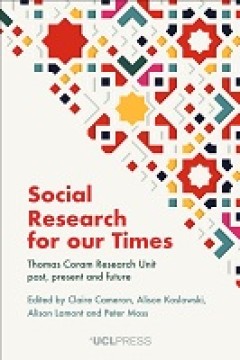
E-Book Social Research for our Times: Thomas Coram Research Unit past, presen…
For 50 years, researchers at UCL’s Thomas Coram Research Unit have been undertaking ground-breaking policy-relevant social research. Their main focus has been social issues affecting children, young people and families, and the services provided for them. Social Research for our Times brings together different generations of researchers from the Unit to share some of the most important result…
- Edisi
- -
- ISBN/ISSN
- 9781800084056
- Deskripsi Fisik
- 418 halaman
- Judul Seri
- -
- No. Panggil
- 907 CAM s
E-book Environment in the Courtroom Vol. 2
here are also a set of statutory offence provisions that proscribe speci-fied conduct. These offences can be prosecuted in the courts, and guilty de-fendants can be penalized by fines, prescribed conduct (such as soil or water remediation), and even imprisoned.Such offences are not pure criminal offences that require proof of intent. Rather, they are regulatory offences that require only proof …
- Edisi
- Vol. 2
- ISBN/ISSN
- 9781773853802
- Deskripsi Fisik
- 493 hlm
- Judul Seri
- -
- No. Panggil
- 347.01 CUL e
E-book Music Practices Across Borders : (E)Valuating Space, Diversity and Exc…
Music practices, understood as activities connected to humanly organized sound, extend beyond enclosed spaces both physically and metaphorically, crossing borders of all kinds. When they cross the borders of national states and create stable networks among musicians, fans, people involved in the music business, etc., they can be considered transnational. Cen…
- Edisi
- -
- ISBN/ISSN
- 9783839446676
- Deskripsi Fisik
- 215 hlm
- Judul Seri
- -
- No. Panggil
- 780.72 KAH m
E-book Gear Acquisition Syndrome : Consumption of Instruments and Technology …
Although not di-rectly related to GAS, it is worth mentioning that the German music instrument re-tailer Thomann (2019) hosts an annual summer camp as part of its ‘Gearhead Uni-versity’. YouTubers get the opportunity to review each piece of equipment in Thomann’s warehouse in a small village in southern Germany, document their ex-periences on video and share them online with fe…
- Edisi
- -
- ISBN/ISSN
- -
- Deskripsi Fisik
- 285 hlm
- Judul Seri
- -
- No. Panggil
- 780.2 HER g
E-book Global Strategy for The Conservation and Use of Eggplants
Common eggplant (Solanum melongena L.), also known as aubergine, brinjal eggplant or eggplant, is a warm season crop mainly cultivated in tropical and subtropical climates. Brinjal eggplant and S. melongena will be used interchangeably in this report. Two other cultivated eggplant species, scarlet eggplant (Solanum aethiopicum L.) and gboma eggplant (Solanum macrocarpon L.), have local importan…
- Edisi
- -
- ISBN/ISSN
- -
- Deskripsi Fisik
- 68 hlm
- Judul Seri
- -
- No. Panggil
- 635.6 GIO g
E-book Snow in the Tropics : A History of the Independent Reefer Operators
he supermarket presents us with a cornucopia of fruit, fish, and meat from near and far. Usually we haven’t thought too much about how it all got there and the fact that we can enjoy fruit from the tropics all year round is something that we usually take for granted. But we are constantly reminded of the perish-ability of these refrigerated and frozen foods. Bananas, for example, …
- Edisi
- -
- ISBN/ISSN
- 9789004393868
- Deskripsi Fisik
- 293 hlm
- Judul Seri
- -
- No. Panggil
- 387.5 LEN s
E-book Reimagining Urban Nature : Literary Imaginaries for Posthuman Cities
We, entangled humans and nonhumans, are at a critical point in managing environmental degradation, with human-induced environ-mental change occurring on a grand scale. Several environmental problems need urgent attention, including climate change, the sixth great extinction of plants and other animals, and increasing resource depletion in some of the most vuln…
- Edisi
- -
- ISBN/ISSN
- 9781802079081
- Deskripsi Fisik
- 280 hlm
- Judul Seri
- -
- No. Panggil
- 307.76 BOR r
E-book Pacific Climate Cultures : Living Climate Change in Oceania
Cultural concepts and ecologies are vitally inseparable, mutually constitutive and made living through each other. Pacific philosophies understand oceans, lands and skies as agentive, malleable living forms participating in, constitutive of and responsive to cosmological and kinship-based relations capable of encompassing the perspectives of fish and the rel…
- Edisi
- -
- ISBN/ISSN
- 9783110591415
- Deskripsi Fisik
- 195 hlm
- Judul Seri
- -
- No. Panggil
- 363.7 CRO p
E-book The Institution of Criticism
he recognition that a literary text is embedded in a historical context that can be defined in cultural, political, and social terms has been common knowledge for sorne time. This insight, however, has not been fully appreciated in the examination of various forms of literary criticism-scholarly books and articles, journalistic essays, book reviews in newspapers, and the like. Yet studies…
- Edisi
- -
- ISBN/ISSN
- 9781501707186
- Deskripsi Fisik
- 288 hlm
- Judul Seri
- -
- No. Panggil
- 801.9 HOH t
E-book Youth in Indonesia
The youth of today are generally healthier, better educated, more urbanized, enjoy greater access to knowledge, and are more connected with the rest of the world than the preceding generations. A growing body of research attributes this marked improvement in the life situations of young people to socio-economic development and the ensuing prolonged transition to adulthood.1 Relative to their pa…
- Edisi
- -
- ISBN/ISSN
- -
- Deskripsi Fisik
- 152 hlm
- Judul Seri
- -
- No. Panggil
- 305.2598 ADI y
E-book Ethnographic Causality
What role can the analysis of a single, or perhaps only just a few, case(s) play in a systematic social science? More particularly, what role can the study of a handful of comparative cases (based upon individuals or social groupings of one sort or another) play in discovering causal relationships between designated causes and effects with a view to furnishing explanations and perhaps even mode…
- Edisi
- -
- ISBN/ISSN
- 9789403429465
- Deskripsi Fisik
- 144 hlm
- Judul Seri
- -
- No. Panggil
- 305.8 ABE e
E-book The Definitive Guide to Copywriting
Copywriting is critical for success online in the current digital age. Design, content marketing, SEO, and growth hacking are all parts of a complete digital marketing plan, but copywriting is the glue that ties it all together. Copy gives your design meaning and lays the foundation for your content marketing, SEO, and growth hacking. Writing better copy enables you to convert more readers into…
- Edisi
- -
- ISBN/ISSN
- -
- Deskripsi Fisik
- 125 hlm
- Judul Seri
- -
- No. Panggil
- 659.13 PAT t
E-book The Life of Breath in Literature, Culture and Medicine Classical to C…
This open access book studies breath and breathing in literature and culture and provides crucial insights into the history of medicine, health and the emotions, the foundations of beliefs concerning body, spirit and world, the connections between breath and creativity and the phenomenology of breath and breathlessness. Contributions span the classical, medieval, early modern, Romantic, Victori…
- Edisi
- -
- ISBN/ISSN
- 2634-6443
- Deskripsi Fisik
- 558 hlm
- Judul Seri
- -
- No. Panggil
- 902 ADE t
E-book A City in Blue and Green : The Singapore Story
his book is about Singapore’s development into a city in which water and vegetation, along with associated environmental, technical, social and political aspects have been harnessed and cultivated into a livable sustainable way of life. It is also a story about a unique and thoroughgoing approach to large-scale and potentially transferable water sustainability, within largely urbanized circum…
- Edisi
- -
- ISBN/ISSN
- 9789811395970
- Deskripsi Fisik
- 161 hlm
- Judul Seri
- -
- No. Panggil
- 363.75957 ROW a
E-book Communicating Science : A Global Perspective
This book is a comprehensive attempt to chart the history of science communication as it developed in the modern era. It tells the story from the perspective of researchers and practitioners in the field, collecting accounts of how modern science communication has developed internationally. The book contains 40 chapters: two introductory chapters, 36 chapt…
- Edisi
- -
- ISBN/ISSN
- 9781760463663
- Deskripsi Fisik
- 994 hlm
- Judul Seri
- -
- No. Panggil
- 500 BRO c
E-book Explaining Imagination
uppose you awoke one day having lost your imagination.Some things would be easier. There would be no wavering on what clothes to wear. You wouldn’t be able to imagine the different possibilities. The creativity of your work might suffer, however. And you would do well to avoid films and novels with absurd or devastating plot lines. Unable to imagine the events descri…
- Edisi
- -
- ISBN/ISSN
- 9780198815068
- Deskripsi Fisik
- 336 hlm
- Judul Seri
- -
- No. Panggil
- 153.3 HAS e
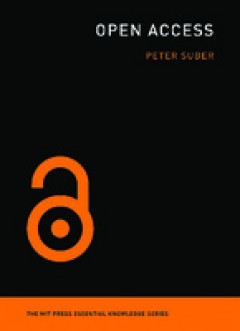
E-Book Open Access
A concise introduction to the basics of open access, describing what it is (and isn't) and showing that it is easy, fast, inexpensive, legal, and beneficial.The Internet lets us share perfect copies of our work with a worldwide audience at virtually no cost. We take advantage of this revolutionary opportunity when we make our work “open access”: digital, online, free of charge, and free of …
- Edisi
- Cet. 2
- ISBN/ISSN
- 9780262517638
- Deskripsi Fisik
- 256 pages
- Judul Seri
- -
- No. Panggil
- 070.5’7973 SUB o
E-book Reimagining the Role of Technology in Education
Technology can be a powerful tool for transforming learning. It can help affirm and advance relationships between educators and students, reinvent our approaches to learning and collaboration, shrink long-standing equity and accessibility gaps, and adapt learning experiences to meet the needs of all learners. Our schools, community colleges, adult learning centers and universities should be inc…
- Edisi
- -
- ISBN/ISSN
- -
- Deskripsi Fisik
- 111 hlm
- Judul Seri
- -
- No. Panggil
- 370 SOU r
E-book Artificial Intelligence : A Modern Approach
We call ourselves Homo sapiens—man the wise—because our intelligence is so important to us. For thousands of years, we have tried to understand how we think; that is, how a mere handful of matter can perceive, understand, predict, and manipulate a world far larger and more complicated than itself. The field of artificial intelligence, or AI, goes further still: it ARTIFICIAL INTELLIGENCE at…
- Edisi
- 3rd ed.
- ISBN/ISSN
- 9780136042594
- Deskripsi Fisik
- 1151 hlm
- Judul Seri
- -
- No. Panggil
- 006.3 RUS a
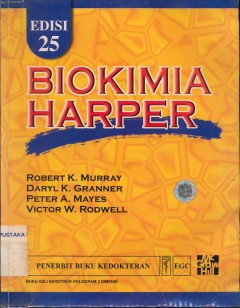
Biokimia Harper
Buku ini memberikan mahasiswa kedokteran dasar-dasar ilmu biokimia dengan cara yang menarik dan relevan. Dalam buku yang ringkas tetapi komprehesif ini, tercakup studi kasus terbaru, diskusi mengenai penyakit-penyakit biokimia dan informasi klinis. * Terdapat pula informasi mengenai keadaan medis yang menjadi prevalensi, mencakup hiperkolesterolemia, obesitas, dan diabetes melitus. * Memberi …
- Edisi
- Cet. 1 Ed. 25
- ISBN/ISSN
- 9794485934
- Deskripsi Fisik
- ix + 883 hlm.; illus.
- Judul Seri
- -
- No. Panggil
- 572 MUR b
E-book Falk
Several of us, all more or less connected with the sea, were dining in a small river-hostelry not more than thirty miles from London, and less than twenty from that shallow and dangerous puddle to which our coasting men give the grandiose name of "German Ocean." And through the wide windows we had a view of the Thames; an enfilading view down the Lower Hope Reach. But the dinner was execr…
- Edisi
- -
- ISBN/ISSN
- -
- Deskripsi Fisik
- 146 hlm; 0.2 mb
- Judul Seri
- -
- No. Panggil
- 823 CON f
E-book The mirror of the sea
"And shippes by the brinke comen and gon, And in swich forme endure a day or two." The Frankeleyn's Tale. Landfall and Departure mark the rhythmical swing of a seaman's life and of a ship's career. From land to land is the most concise definition of a ship's earthly fate. A "Departure" is not what a vain people of landsmen may think. The term "Landfall" is more easily understood; you fal…
- Edisi
- -
- ISBN/ISSN
- -
- Deskripsi Fisik
- 233 hlm; 0.4 mb
- Judul Seri
- -
- No. Panggil
- 823 CON t
E-book The secret agent
Mr Verloc, going out in the morning, left his shop nominally in charge of his brother-in-law. It could be done, because there was very little business at any time, and practically none at all before the evening. Mr Verloc cared but little about his ostensible business. And, moreover, his wife was in charge of his brother-in-law. The shop was small, and so was the house. It was one of thos…
- Edisi
- -
- ISBN/ISSN
- -
- Deskripsi Fisik
- 404 hlm; 0.6 mb
- Judul Seri
- -
- No. Panggil
- 823 CON t
E-book Typhoon
CAPTAIN MACWHIRR, of the steamer Nan-Shan, had a physiognomy that, in the order of material appearances, was the exact counterpart of his mind: it presented no marked characteristics of firmness or stupidity; it had no pronounced characteristics whatever; it was simply ordinary, irresponsive, and unruffled. The only thing his aspect might have been said to suggest, at times, was bashfulne…
- Edisi
- -
- ISBN/ISSN
- -
- Deskripsi Fisik
- 140 hlm; 0.2 mb
- Judul Seri
- -
- No. Panggil
- 823 CON t
E-book Red masquerade
The gentleman was not in the least bored who might have been and was seen on that wintry afternoon in Nineteen hundred, lounging with one shoulder to a wall of the dingy salesroom and idly thumbing a catalogue of effects about to be put up at auction; but his insouciance was so unaffected that the inevitable innocent bystander might have been pardoned for perceiving in him a pitiable victi…
- Edisi
- -
- ISBN/ISSN
- -
- Deskripsi Fisik
- 345 hlm; 0.5 mb
- Judul Seri
- -
- No. Panggil
- 823 VAN r
E-book The bronze bell
Breaking suddenly upon the steady drumming of the trucks, the prolonged and husky roar of a locomotive whistle saluted an immediate grade-crossing. Roused by this sound from his solitary musings in the parlour-car of which he happened temporarily to be the sole occupant, Mr. David Amber put aside the magazine over which he had been dreaming, and looked out of the window, catching a glimps…
- Edisi
- -
- ISBN/ISSN
- -
- Deskripsi Fisik
- 427 hlm; 0.6 mb
- Judul Seri
- -
- No. Panggil
- 823 VAN t
E-book Some reminiscences
As a general rule we do not want much encouragement to talk about ourselves; yet this little book is the result of a friendly suggestion, and even of a little friendly pressure. I defended myself with some spirit; but, with characteristic tenacity, the friendly voice insisted: "You know, you really must." It was not an argument, but I submitted at once. If one must!. You perceive the for…
- Edisi
- -
- ISBN/ISSN
- -
- Deskripsi Fisik
- 175 hllm; 0.3 mb
- Judul Seri
- -
- No. Panggil
- 823 CON s
E-book Heart of darkness
The Nellie, a cruising yawl, swung to her anchor without a flutter of the sails, and was at rest. The flood had made, the wind was nearly calm, and being bound down the river, the only thing for it was to come to and wait for the turn of the tide. The sea-reach of the Thames stretched before us like the beginning of an interminable waterway. In the offing the sea and the sky were welded t…
- Edisi
- -
- ISBN/ISSN
- -
- Deskripsi Fisik
- 155 hlm, 0.2 mb
- Judul Seri
- -
- No. Panggil
- 823 CON h
Pria dan wanita
- Edisi
- -
- ISBN/ISSN
- -
- Deskripsi Fisik
- 176 hlm; 22 cm x 26 cm
- Judul Seri
- -
- No. Panggil
- 155 SWE p
- Edisi
- -
- ISBN/ISSN
- -
- Deskripsi Fisik
- 176 hlm; 22 cm x 26 cm
- Judul Seri
- -
- No. Panggil
- 155 SWE p

Spy catcher otobiografi yang menghebohkan
- Edisi
- -
- ISBN/ISSN
- -
- Deskripsi Fisik
- ix, 337 hlm. 12x24 cm
- Judul Seri
- -
- No. Panggil
- 923 WRI s
- Edisi
- -
- ISBN/ISSN
- -
- Deskripsi Fisik
- ix, 337 hlm. 12x24 cm
- Judul Seri
- -
- No. Panggil
- 923 WRI s

Para kudus dan martir serikat Yesus 4
Judul asli : Jesuit saints and martyns
- Edisi
- Cet. 1
- ISBN/ISSN
- -
- Deskripsi Fisik
- 4 jil. :ilus. ;21 cm.
- Judul Seri
- -
- No. Panggil
- 235 TYL p

Para kudus dan martir Serikat Yesus 3
Teks dalam bahasa Indonesia, diterjemahkan dari bahasa Inggris
- Edisi
- Cet. 1
- ISBN/ISSN
- -
- Deskripsi Fisik
- 4 jil. :ilus. 14 cm x 21 cm
- Judul Seri
- -
- No. Panggil
- 230 TYL p
 Karya Umum
Karya Umum  Filsafat
Filsafat  Agama
Agama  Ilmu-ilmu Sosial
Ilmu-ilmu Sosial  Bahasa
Bahasa  Ilmu-ilmu Murni
Ilmu-ilmu Murni  Ilmu-ilmu Terapan
Ilmu-ilmu Terapan  Kesenian, Hiburan, dan Olahraga
Kesenian, Hiburan, dan Olahraga  Kesusastraan
Kesusastraan  Geografi dan Sejarah
Geografi dan Sejarah